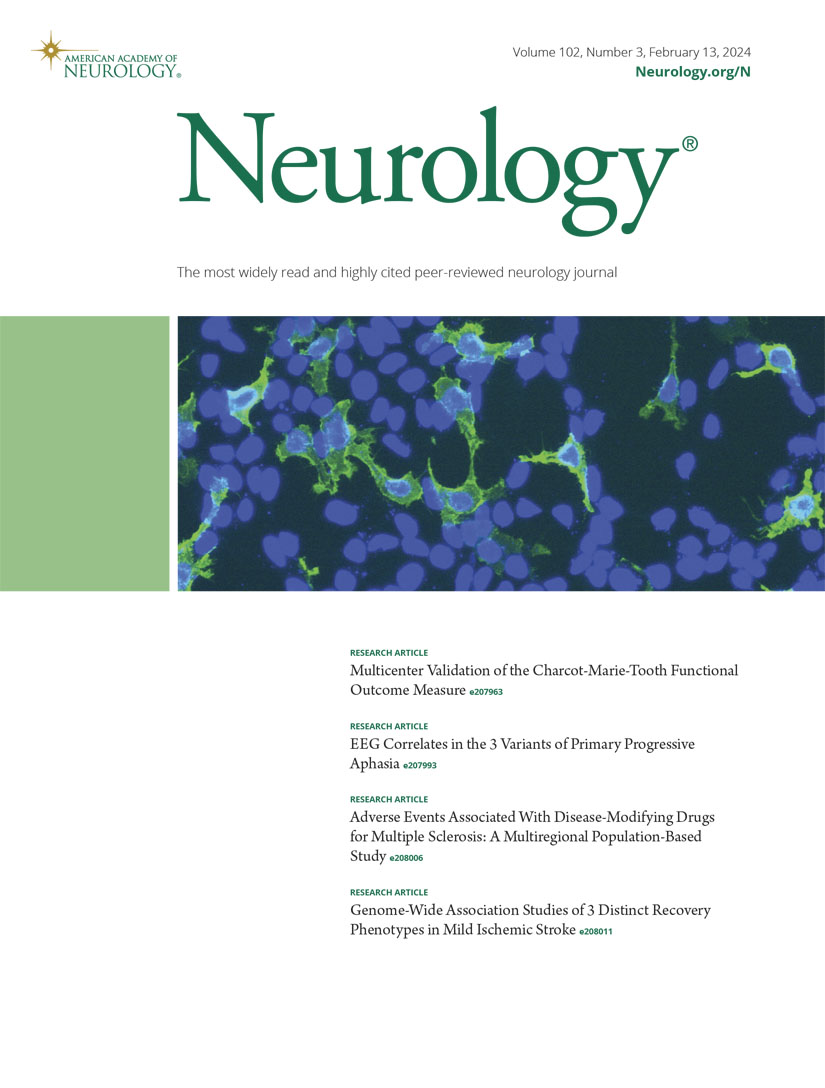研究血浆代谢组学和与帕金森病相关的肠道微生物群变化:以咖啡因代谢为重点
IF 7.7
1区 医学
Q1 CLINICAL NEUROLOGY
引用次数: 0
摘要
背景和目的咖啡摄入量与帕金森病(PD)风险的降低有关,但这种效应是否由肠道微生物群和代谢组变化介导仍不清楚。本研究在一项多中心研究中探讨了与帕金森病相关的代谢组学变化、咖啡因代谢及其与肠道微生物组改变之间的联系。方法我们对从台湾大学医院(National Taiwan University Hospital,NTUH)招募的探索性队列进行了一项非靶向血清代谢组学测定,采用的是液相色谱-高分辨质谱法。在马来亚大学医学中心(UMMC)的一个独立队列中,我们进行了以咖啡因及其 12 种下游代谢物为重点的靶向代谢组学检测并进行了验证。在探索性队列中,通过元基因组猎枪测序研究了每种咖啡因代谢物与肠道微生物群变化的关联。采用基于聚类的方法将微生物群变化与血浆咖啡因代谢物水平和临床严重程度联系起来。结果台大医院的63名帕金森病患者和54名对照组组成了探索性队列,而联大医学院的36名帕金森病患者和20名对照组组成了验证性队列,以复制血浆咖啡因的研究结果。非靶向代谢组分析共检测到5158种代谢物,其中3131种具有较高的分析可信度。与对照组相比,帕金森病患者56种代谢物的丰度明显升高,7种代谢物的丰度明显降低(调整后P<0.05,对折变化>1)。帕金森氏症患者的咖啡因代谢明显降低(p = 0.0013),血清中咖啡因及其代谢物的水平与运动严重程度呈负相关(p < 0.01)。靶向代谢组学分析证实,在帕金森病患者中,咖啡因及其代谢物(包括茶碱、对羟基黄嘌呤、1,7-二甲基尿酸和5-乙酰氨基-6-氨基-3-甲基尿嘧啶)的水平降低;这些发现在验证队列中得到了重复(p < 0.05)。聚类方法发现,在帕金森病患者中富集的 56 种微生物与咖啡因及其代谢产物对氧茶碱和茶碱呈负相关(p 均< 0.05),特别是梭状芽孢杆菌 sp000435655、醋酸纤维梭状芽孢杆菌 sp900066565、Oliverpabstia intestinalis 和 Ruminiclostridium siraeum。我们的研究结果为咖啡因与微生物组在帕金森病中相互作用的未来功能研究提供了启示。本文章由计算机程序翻译,如有差异,请以英文原文为准。
Investigating Plasma Metabolomics and Gut Microbiota Changes Associated With Parkinson Disease: A Focus on Caffeine Metabolism.
BACKGROUND AND OBJECTIVES
Coffee intake is linked to a reduced risk of Parkinson disease (PD), but whether this effect is mediated by gut microbiota and metabolomic changes remains unclear. This study examines PD-associated metabolomic shifts, caffeine metabolism, and their connection to gut microbiome alterations in a multicenter study.
METHODS
We conducted an untargeted serum metabolomic assay using liquid chromatography with high-resolution mass spectrometry on an exploratory cohort recruited from National Taiwan University Hospital (NTUH). A targeted metabolomic assay focusing on caffeine and its 12 downstream metabolites was conducted and validated in an independent cohort from University Malaya Medical Centre (UMMC). In the exploratory cohort, the association of each caffeine metabolite with gut microbiota changes was investigated by metagenomic shotgun sequencing. A clustering-based approach was used to correlate microbiome changes with plasma caffeine metabolite level and clinical severity. Body mass index, antiparkinsonism medication use, and dietary habits (including coffee and tea intake) were recorded.
RESULTS
Sixty-three patients with PD and 54 controls from NTUH formed the exploratory cohort while 36 patients with PD and 20 controls from UMMC served as an validation cohort to replicate the plasma caffeine findings. A total of 5,158 metabolites were detected from untargeted metabolomic analysis, with 3,131 having high confidence for analysis. Compared with controls, the abundance of 56 metabolites was significantly higher and that of 7 metabolites was significantly lower (adjusted p < 0.05 and log2 fold change >1) in patients with PD. Caffeine metabolism was significantly lower in patients with PD (p = 0.0013), and serum levels of caffeine and its metabolites negatively correlated with motor severity (p < 0.01). Targeted metabolomic analysis confirmed reduced levels of caffeine and its metabolites, including theophylline, paraxanthine, 1,7-dimethyluric acid, and 5-acetylamino-6-amino-3-methyluracil, in patients with PD; these findings were replicated in the validation cohort (p < 0.05). A clustering approach found that 56 microbiome species enriched in patients with PD negatively correlated with caffeine and its metabolites paraxanthine and theophylline (both p < 0.05), notably Clostridium sp000435655, Acetatifactor sp900066565, Oliverpabstia intestinalis, and Ruminiclostridium siraeum.
DISCUSSION
This study identifies PD-related changes in microbial-caffeine metabolism compared with controls. Our findings offer insights for future functional research on caffeine-microbiome interactions in PD.
求助全文
通过发布文献求助,成功后即可免费获取论文全文。
去求助
来源期刊

Neurology
医学-临床神经学
CiteScore
12.20
自引率
4.00%
发文量
1973
审稿时长
2-3 weeks
期刊介绍:
Neurology, the official journal of the American Academy of Neurology, aspires to be the premier peer-reviewed journal for clinical neurology research. Its mission is to publish exceptional peer-reviewed original research articles, editorials, and reviews to improve patient care, education, clinical research, and professionalism in neurology.
As the leading clinical neurology journal worldwide, Neurology targets physicians specializing in nervous system diseases and conditions. It aims to advance the field by presenting new basic and clinical research that influences neurological practice. The journal is a leading source of cutting-edge, peer-reviewed information for the neurology community worldwide. Editorial content includes Research, Clinical/Scientific Notes, Views, Historical Neurology, NeuroImages, Humanities, Letters, and position papers from the American Academy of Neurology. The online version is considered the definitive version, encompassing all available content.
Neurology is indexed in prestigious databases such as MEDLINE/PubMed, Embase, Scopus, Biological Abstracts®, PsycINFO®, Current Contents®, Web of Science®, CrossRef, and Google Scholar.
 求助内容:
求助内容: 应助结果提醒方式:
应助结果提醒方式:


